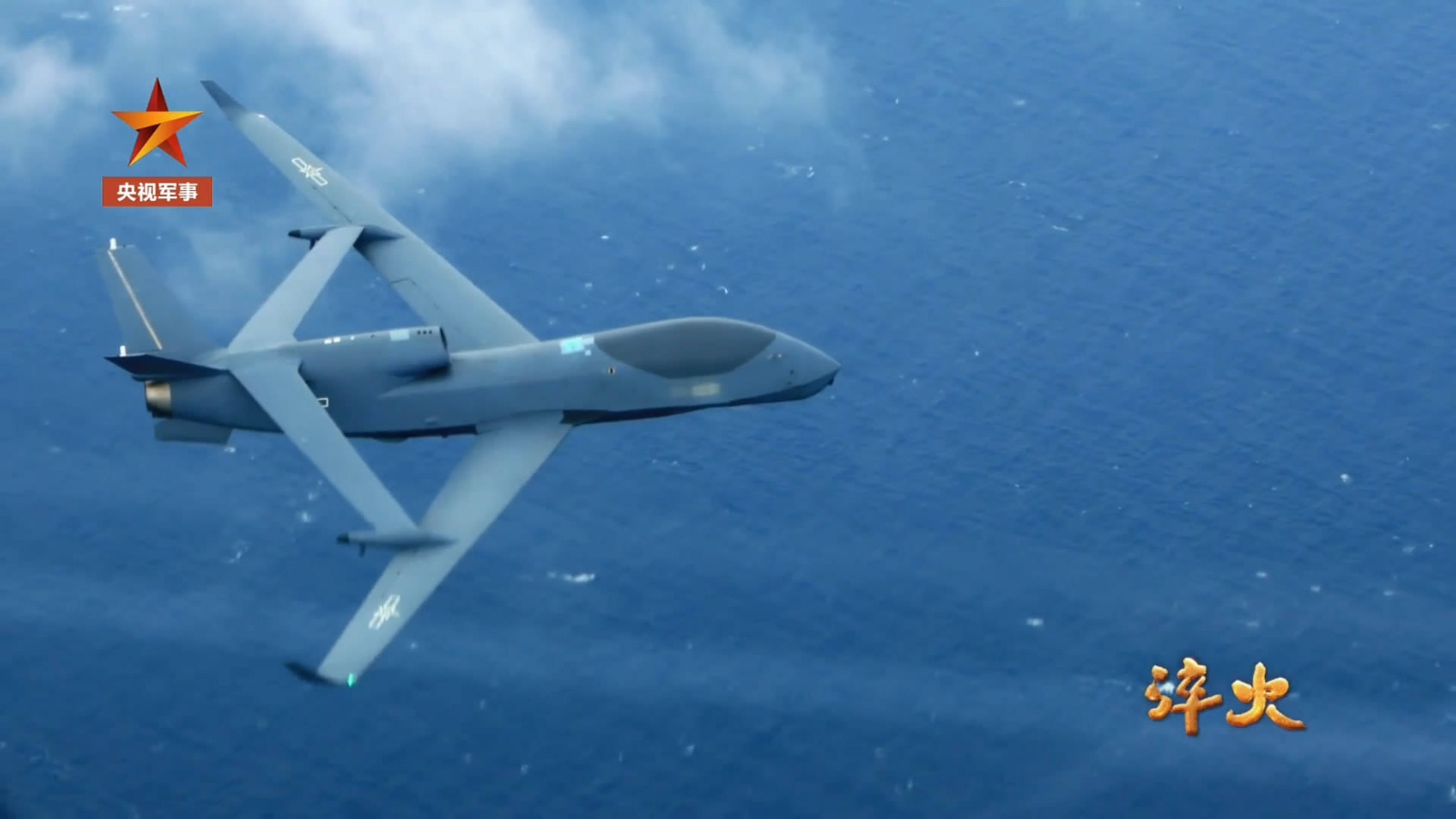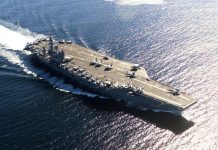A WZ-7 Soaring Dragon drone of the Chinese People’s Liberation Army (PLA) recently teamed up with a Chinese bomber for military drills. This appears to be an attempt by China to integrate drones with manned fighters as part of its future combat strategy.
China’s state-owned broadcaster, CCTV, released footage of the drills on September 15, showcasing the nation’s expanding aerial surveillance capabilities. The PLA shows crewed fighter jets and WZ-7 reconnaissance drones operating together. The video, seemingly recorded from the air, has since been published on social media and shared widely.
The WZ-7 drone, which has a distinctive and instantly identifiable joined-wing shape, could be seen conducting maritime reconnaissance and surveillance flights. The drone then sent the Xian H-6 bomber the coordinates of a target, which the bomber used to launch an anti-ship attack.
The footage showed the WZ-7 and the Xian H-6 bomber, as well as a sizable naval fleet with several other ships and fighter jets, including electronic warfare aircraft and the Shenyang J-16 multirole strike fighter.
The broadcast provided no information on the location and timing of these drills. However, EurAsian Times understands this is the first time that the PLA has openly acknowledged the teaming of reconnaissance drones and bombers as part of a military simulation.
Elaborating on the teaming up, PLA Air Force officer Li Zhengwei said in the broadcast that using the WZ-7 as support, Chinese air forces might “burst into the enemy’s circle of fire.” The officer, quoted by the South China Morning Post, pointed out that the reconnaissance drone’s “survivability, battle loss ratio, and cost-effectiveness” allow it to perform tasks that “manned aircraft cannot.”
In a video released by Chinese state media on Sept. 16, a WZ-7 high-altitude long endurance drone provided target coordinate to a H-6K bomber for launching an anti-ship missile.
Video contained air-to-air footage of WZ-7.https://t.co/f05NCoSCUM pic.twitter.com/sPuXjzJBM8
— Ryan Chan 陳家翹 (@ryankakiuchan) September 16, 2024
Li further claimed that the Air Force could use drones to “find and see [enemies] within hundreds of kilometers” and gather intelligence quickly due to its “upgraded equipment, algorithms, and intelligence acquisition capabilities.” Such cooperation would probably improve China’s ability to launch a successful attack, particularly in close-quarters warfare.
Global militaries, including the United States, are exploring the role of drones in precisely locating coordinates, assisting crewed fighters, and augmenting the aircraft’s attack capability.
U.S. Plans 1000 6th-Gen “Robo Warplanes” To Fight Chinese PLAAF; Decoding USAF’s ‘Master Plan’
The US is working on Collaborative Combat Aircraft (CCAs) to operate alongside the upcoming B-21 bomber and F-35 stealth fighters.
The SCMP report cited a former colonel from the People’s Liberation Army as saying that the teaming is “a lesson that China has learned from the Ukraine war”. Former PLA colonel Yue Gang claimed that using fighter jets with surveillance drones improved strikes against battlefield targets by reducing the time between obtaining intelligence and initiating an attack.
“The information-gathering methods through satellites do not have real-time capability, while through the cooperation of WZ-7 and crewed aircraft, it will be possible to strike the discovered targets immediately without giving the enemy time to react,” he said.

In the ongoing Ukraine war, drones have been extensively deployed by both sides to aid precision artillery strikes. Moreover, Russia has highlighted an upsurge in US drone activity over the Black Sea, accusing the country and NATO of conducting intelligence and targeting missions to aid the Ukrainian military.
These drones, according to Russia, collect and transmit information about targets to the Ukrainian army which then launches precision attacks.
Given the current state of Indo-Pacific security, the PLA’s experiment of teaming drones with bombers is significant. There is widespread speculation that the PLA is planning to use a massive fleet of drones in future Taiwan operations.
PLA’s WZ-7 Drone
The WZ-7 has been used by the PLA Air Force (PLAAF) in the Tibetan region, possibly to spy across the border into India.
It has also been operated from the crucial Yishuntun Airbase near the North Korean border. The Indo-Pacific region, where tensions are high, has seen a higher frequency of drone deployments.
In September 2022, amid rising tensions in the Taiwan Strait, the WZ-7 was detected operating near Taiwan for the first time. A few months later, the WZ-7 Soaring Dragon drones made headlines when it unexpectedly increased its operations over the East China Sea. Taiwan has since detected the drone multiple times amid an increased PLA presence in the region.
The WZ-7 was seen flying over the East China Sea on January 1, according to the Japanese Ministry of Defense (MoD). In response, the Japanese defense ministry was forced to scramble fighter jets.

On March 26, a PLA long-endurance unmanned aerial vehicle (UAV) operating at high altitudes conducted its inaugural flight maneuvers over the Sea of Japan. The Japanese Ministry of Defense (MoD) issued a terse statement detailing the incident, noting that the Air Self-Defense Force was compelled to dispatch fighter jets in response to the presence of the Chinese drone.
Less than a month later, as the Philippines geared to receive a shipment of BrahMos anti-ship missile from India in April 2024, a WZ-7 Soaring Dragon drone was spotted hovering over the West Philippine Sea, a section of the South China Sea to the northwest of the Philippine archipelago.
The WZ-7 Soaring Dragon is a high-altitude, long-endurance unmanned aerial vehicle (UAV) and is frequently compared to the US RQ-4B Global Hawk HALE-class drone, now in use by Japan.
The People’s Liberation Army Air Force and the People’s Liberation Army Navy (PLAN) use the jet-powered WZ-7, which has a range of roughly 4,350 miles and a service ceiling of approximately 60,000 feet. While publicly available estimates suggest a minimum endurance of 10 hours, actual flight durations could be significantly longer.
The drone’s capabilities align with China’s “Intelligentized Warfare” concept.
- Contact the author at sakshi.tiwari9555(at)gmail.com
- Follow EurAsian Times on Google News




